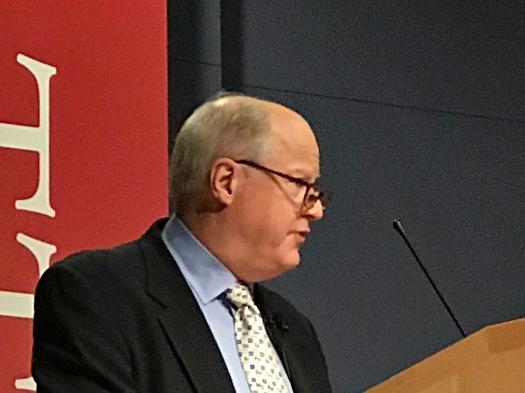McKinstry CEO Urges Bucking Conventional Wisdoms
Posted by Joseph M. Phillips on Friday, November 2, 2018 at 1:17 PM PDT

Dean Allen, CEO of McKinstry, joined the Albers Executive Speaker Series on November 2nd to discuss how McKinstry has had success as a purpose-driven firm bucking some conventional wisdoms along the way. Under Allen’s leadership, McKinstry has evolved from a mechanical contractor into a comprehensive design, build, operate, and maintain (DBOM) enterprise with more than $500 million in annual revenues and nearly 2,700 employees.
“Building on Unconventional Wisdoms” was the theme of the talk and Allen got right to sharing them. The first was that a positive financial outcome was not a goal, but a consequence of what they do well. The aim is to take care of employees, add value for customers, contribute to the community and be a business with a purpose. If you can do all that, you will be profitable.
Second, instead of avoiding risk and shifting it to parties that are the least qualified to manage it, they embrace it as a DBOM business. They don’t subcontract things out. They try to do it all and do it well. There are many risks in building and maintaining a facility. Their promise is to take care of all of them.
According to Allen, in construction industry they were told to stick to construction. Servicing is a very different business, so stay out of it and stick with what you know. But Allen noted that in building a facility you learn so much about it, and so it only makes sense to leverage that knowledge in the service business. The result is they have 10,000 buildings with preventive maintenance contracts.
A fourth conventional wisdom they have rejected is the idea that in any successful business you need high achieving, entrepreneurial employees who need to be handsomely rewarded. Yet that runs counter to their focus on building a culture of teamwork and collaboration, so they don’t do that.
Another belief is that you need to be a non-union shop in order to be successful in construction. But McKinstry likes trade unions because the unions will supply the well-trained tradespeople they need when they need them, and McKinstry will know these workers are well paid, have health insurance, have retirement plans, etc…. which goes with their philosophy of taking care of employees.
Allen also thinks their contrarian view about technology has served them well. The conventional wisdom is to not be on the bleeding edge and jump on the latest technology. But based on what they have learned from important clients such as Microsoft, they want to be an early adopter.
In the question and answer period, Allen was asked about making the right decision under uncertainty. How do you figure out whether to launch a new business line, etc….? He takes a portfolio approach. Some things that you are doing are low risk and serve as a base line (for preserving company jobs, for example), while others are higher risk. The lower risk activities serve as a backstop from which to think about doing higher risk initiatives.
Another question was around fostering innovation. He responded that innovation is more likely to occur in an enterprise where people feel they are making a difference. It is in that environment that they can feel brave, direct that passion, and sell their idea internally on the basis of the firm’s values. Purpose-based businesses are likely to foster innovation, in other words.
When asked what career advice he might offer to students, Allen quipped, “Come work with me at McKinstry!” He then added that students should keep in mind that life is a journey, and they need to find something that is purposeful. In finding that purpose, there may be moments when one needs to be “mercenary” (do something without a lot of purpose) in order get you to where you ultimately want to be.
When asked what advice he would give to a smaller firm in the construction industry, he noted that it does not get any better than this, and in construction today, “even the blind squirrels are finding nuts.” Everyone thinks they are really smart now, but what happens when the demand for your services is cut by a third? Figure out now which customers you have your strongest ties with, and be laser focused on serving those customers well, even if they are not your most profitable customers. You need to retain these customers through thick and thin, because if you look for new customers in a downturn, you will not find them. Of course, that is not just good advice for the construction industry!
Dean Allen has some great insights for our students. He is a smart, inspirational leader who is committed to advancing the Common Good! He is a great role model for our students!
